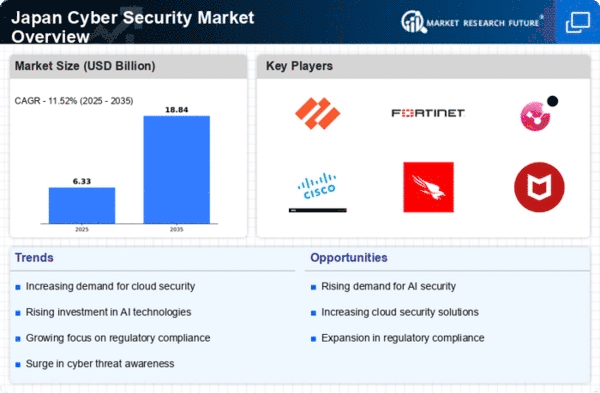Rising Cyber Threats
The Cyber Security Market Overview in Japan is experiencing a surge in demand due to the increasing frequency and sophistication of cyber threats. Reports indicate that cyber incidents have escalated by over 30% in recent years, prompting organizations to prioritize their security measures. This trend is particularly evident in sectors such as finance and healthcare, where sensitive data is at risk. As a result, businesses are investing heavily in advanced security solutions, including threat detection and response systems. The urgency to protect critical infrastructure and personal information is driving growth in the cyber security market, as companies seek to mitigate potential damages that could arise from data breaches and cyberattacks.
Technological Advancements
Innovations in technology are significantly influencing the Cyber Security Market Overview in Japan. The advent of artificial intelligence (AI) and machine learning (ML) is transforming how organizations approach security. These technologies enable real-time threat analysis and automated responses, which are crucial in combating evolving cyber threats. Furthermore, the integration of Internet of Things (IoT) devices has expanded the attack surface, necessitating enhanced security measures. As businesses adopt these technologies, the demand for sophisticated cyber security solutions is likely to increase. The market is projected to grow at a compound annual growth rate (CAGR) of approximately 12% over the next five years, reflecting the critical need for advanced security frameworks.
Shift to Remote Work Models
The transition to remote work models has had a profound impact on the Cyber Security Market Overview in Japan. As organizations adapt to flexible work arrangements, the need for secure remote access solutions has become paramount. This shift has led to an increased demand for virtual private networks (VPNs), secure access service edge (SASE) solutions, and endpoint security measures. The cyber security market is responding to these evolving needs by offering tailored solutions that address the unique challenges posed by remote work. Companies are investing in technologies that ensure secure communication and data protection, thereby driving growth in the market. This trend is expected to persist as remote work becomes a more permanent fixture in the corporate landscape.
Increased Regulatory Scrutiny
The Cyber Security Market Overview in Japan is also shaped by heightened regulatory scrutiny. Government initiatives aimed at enhancing data protection and privacy are compelling organizations to comply with stringent regulations. The Personal Information Protection Act (PIPA) mandates that companies implement robust security measures to safeguard personal data. Non-compliance can result in substantial fines, which further incentivizes businesses to invest in cyber security solutions. This regulatory environment is fostering a culture of accountability and diligence in data management, thereby driving growth in the cyber security market. As organizations strive to meet compliance requirements, the demand for specialized security services and technologies is expected to rise.
Growing Awareness of Cyber Risks
There is a notable increase in awareness regarding cyber risks among businesses and consumers in Japan. Educational campaigns and high-profile cyber incidents have highlighted the vulnerabilities associated with inadequate security measures. As a result, organizations are more inclined to invest in comprehensive cyber security strategies. This shift in mindset is particularly evident in small and medium-sized enterprises (SMEs), which are increasingly recognizing the importance of protecting their digital assets. The Cyber Security Market Overview is likely to benefit from this growing awareness, as more companies seek to implement proactive measures to safeguard against potential threats. This trend suggests a promising future for the market as awareness continues to expand.
















